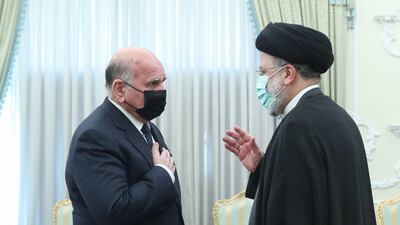Iraq's foreign minister said on a visit to Tehran on Thursday that the time has come for Iran and the US to negotiate directly on the country's nuclear ambitions.
US-Iran relations were severed in April 1980, months after the fall of the shah and the occupation of the American embassy by students loyal to Ayatollah Ruhollah Khomeini.
They worsened significantly after US president Donald Trump's 2018 decision to unilaterally withdraw from the nuclear deal and impose sanctions on Tehran.
Negotiations resumed in November after a five-month hiatus to try to restore the deal, which gave Iran sanctions relief in exchange for curbs on its nuclear activities.
Diplomats from the remaining parties to the deal — Britain, China, France, Germany and Russia — are in talks in Vienna with Iran and the US, with the two sides refusing direct contact.
“We call for, and this is no secret, direct negotiations between the two parties,” Iraqi Foreign Minister Fuad Hussein told a joint press conference.
“Iraq's interest is in helping the two parties to sit round a table and talk,” he said.
“We have proposed this to the Americans and have made this proposal [to Iran] and even before our visit to Tehran.
“It is better that a direct meeting take place between the American party and the Iranian party.”
He said Iraq felt there was a “problem” with the negotiating mechanism at the Vienna talks.
“The negotiations with the American side are indirect, through the European envoy,” he said.
“We think the time has come for direct talks between Washington and Tehran to reach common understandings not just on the nuclear issue, but also on sanctions.
“We need direct contact between the two parties and we are working towards that.”
Iraq is Iran's neighbour, and Mr Hussein said US-Iran relations “are not an external matter for Iraq, but an internal one".
Tension between the long-time foes, he said, directly impacts the political and security situation in Iraq and that detente between the two would have a positive effect.
Iranian Foreign Minister Hossein Amirabdollahian outlined the way contact currently takes place.
“The Americans send unwritten messages to meetings and receive responses” indirectly from Iran, he said.
“As for the Islamic Republic, we seriously declare that we want to reach a good agreement and we hope the other parties also come and negotiate with the same seriousness and the same goodwill,” Mr Amirabdollahian said.
The Vienna talks are set to resume on Monday after a 10-day break.
On Thursday, EU diplomat Enrique Mora, who is chairing the negotiations, said he hoped for speedy progress.
“Important to pick up the pace on key outstanding issues and move forward, working closely with the US. Welcome to the 8th round,” Mora said in Vienna.







